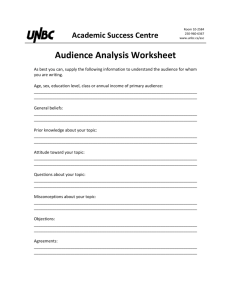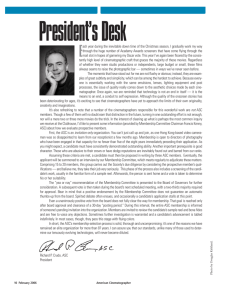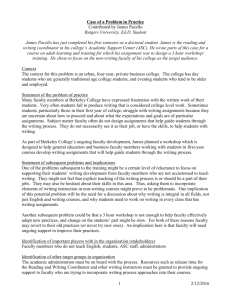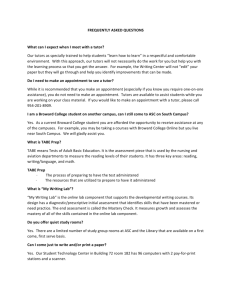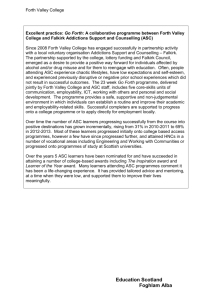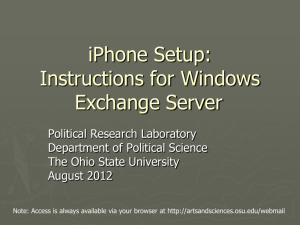Internet, Email and Computer Use Policy
advertisement
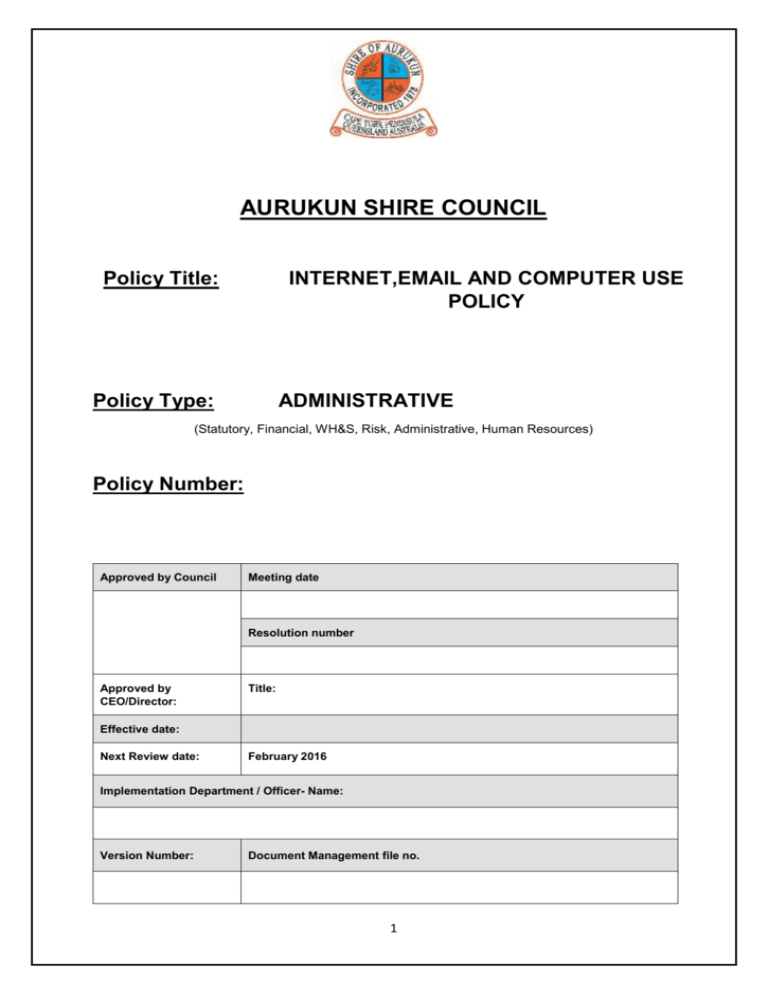
AURUKUN SHIRE COUNCIL Policy Title: INTERNET,EMAIL AND COMPUTER USE POLICY Policy Type: ADMINISTRATIVE (Statutory, Financial, WH&S, Risk, Administrative, Human Resources) Policy Number: Approved by Council Meeting date Resolution number Approved by CEO/Director: Title: Effective date: Next Review date: February 2016 Implementation Department / Officer- Name: Version Number: Document Management file no. 1 1. POLICY BACKGROUND/SCOPE: This policy sets out the standards of behaviour expected of Persons using Aurukun Shire Council (“ASC”)’s computer facilities and “Smart Phones”, or when making reference to ASC on external sites. Application of Policy This policy applies to all people who use ASC’s Computer Network by any means (Users). The policy also applies to Users who contribute to external blogs and sites who identify themselves as associated with ASC. This policy also sets out the type of surveillance that will be carried out in ASC’s workplace, relating to the use of ASC’s Computer Network. This policy does not form part of any employee’s contract of employment. Nor does it form part of any other User’s contract for service 2. POLICY PROVISIONS: 1. Definitions In this policy: (a) “Blogging” means the act of using web log or ‘blog’. ‘Blog’ is an abbreviated version of ‘weblog’ which is a term used to describe websites that maintain an ongoing chronicle of information. A blog is a frequently updated website featuring diary-style commentary, audio-visual material and links to articles on other websites. (b) “Confidential Information” includes but is not limited to trade secrets of ASC; non-public information about the organisation and affairs of ASC such as: pricing information such as internal cost and pricing rates, production scheduling software, special supply information; marketing or strategy plans; exclusive supply agreements or arrangements; commercial and business plans; commission structures; contractual arrangements with third parties; tender policies and arrangements; financial information and data; sales and training materials; technical data; schematics; proposals and intentions; designs; policies and procedures documents; concepts not reduced to material form; information which is personal information for the purposes of privacy law; and all other information obtained from ASC or obtained in the course of working or providing services to ASC that is by its nature confidential. (c) “Computer Surveillance” means surveillance by means of software or other equipment that monitors or records information input or output, or other use, of ASC’s Computer Network (including, but not limited to, the sending and receipt of emails and the accessing of websites). (d) “Computer Network” includes all ASC internet, email and computer facilities which are used by Users, inside and outside working hours, in the workplace of ASC (or a related corporation of ASC) or at any other place while performing work for ASC (or a related corporation of ASC). It includes, but is not limited to, desktop computers, laptop computers, Blackberrys, Palm Pilots, PDAs, other handheld electronic devices, smart phones and similar products, and any other means of accessing ASC’s email, internet and computer facilities, (including, but not limited to, a personal home computer which has access to ASC’s IT systems). 2 (e) “Intellectual Property” means all forms of intellectual property rights throughout the world including copyright, patent, design, trade mark, trade name, and all Confidential Information and including know-how and trade secrets. (f) “Person” includes any natural person, company, partnership, association, trust, business, or other organisation or entity of any description and a Person’s legal personal representative(s), successors, assigns or substitutes. 2. Use of Internet, Email and Computers Where use is allowed, Users are entitled to use ASC’s Computer Network only for legitimate business purposes. Users are permitted to use ASC’s Computer Network for limited and reasonable personal use. However any such personal use must not impact upon the User’s work performance or ASC resources or violate this policy or any other ASC policy. A User must not use ASC’s Computer Network for personal use if that use interferes with the efficient business operations of ASC or relates to a personal business of the User. ASC gives no warranty or assurance about the confidentiality or privacy of any personal information disclosed by any User in the course of using the Computer Network for the User’s personal purposes. Users of the network are not allowed to use the network to carry out any form of abuse or ‘cyberbullying’ in accordance with the Workplace Bullying Policy Whilst ASC makes all effort to respect a person’s privacy it cannot be held responsible for any private details being exposed if the user has used the network for their own personal business. Users of the network will be expected to comply with the principles of the Public Sector Ethics Act 1994 3. Requirements for Use Users must comply with the following rules when using ASC’s Computer Network. (a) Users must use their own username/login code and/or password when accessing the Computer Network. (b) Users in possession of ASC electronic equipment must at all times handle the equipment in a responsible manner and ensure that the equipment is kept secure. (c) Users should protect their username/login code and password information at all times and not divulge such information to any other Person, unless it is necessary to do so for legitimate business reasons. (d) Users should ensure that when not in use or unattended, the Computer System is shut down. (e) A disclaimer is automatically included in all ASC emails, and must not be removed. 4. Prohibited Conduct Users must not use ASC’s Computer Network: (a) to violate copyright or other intellectual property rights. Computer software that is protected by copyright is not to be copied from, or into, or by using ASC’s computing facilities, except as permitted by law or by contract with the owner of the copyright; 3 (b) to create any legal or contractual obligations on behalf of ASC unless expressly authorised by ASC; (c) to disclose any Confidential Information of ASC or any customer, client or supplier of ASC’s unless expressly authorised by ASC; (d) to install software or run unknown or unapproved programs on ASC’s Computer Network. Under no circumstances should Users modify the software or hardware environments on ASC’s Computer Network; (e) to gain unauthorised access (hacking) into any other computer within ASC or outside ASC, or attempt to deprive other Users of access to or use of ASC’s Computer Network; (f) to send or cause to be sent chain or SPAM emails in any format; (g) to use ASC computer facilities for personal gain. For example, running a personal business. (h) No person should access the network server hardware without strict permission of the Director of Corporate services or the IT manager. Users must not use another User’s Computer Network facilities (including passwords and usernames/login codes) for any reason without the express permission of the User or ASC. 5. Details on Blocking Email or Internet Access ASC reserves the right to prevent (or cause to be prevented) the delivery of an email sent to or from a User, or access to an internet website by a User, if the content of the email or the internet website is considered: (a) obscene, offensive or inappropriate. This includes text, images, sound or any other material, sent either in an e-mail message or in an attachment to a message, or through a link to an internet website (URL). For example, material of a sexual nature, indecent or pornographic material; (b) causes or may cause insult, offence, intimidation or humiliation;; (c) defamatory or may incur liability or adversely impacts on the image or reputation of ASC. A defamatory message or material is a message or material that is insulting or lowers the reputation of a Person or a group of people; (d) illegal, unlawful or inappropriate; (e) to have the potential to affect the performance of, or cause damage to or overload ASC Computer Network, or internal or external communications in any way; (f) to give the impression of or is representing, giving opinions or making statements on behalf of ASC without the express authority of ASC. 4 In the case that an email is prevented from being delivered to or from a User, the User will receive a prevented delivery notice. The notice will inform the User that the delivery of the email has been prevented. The notice will not be given if delivery is prevented in the belief that: (a) the email was considered to be SPAM, or contain potentially malicious software; or (b) the content of the email (or any attachment) would or might have resulted in an unauthorised interference with, damage to or operation of any program run or data stored on any of ASC’s equipment; or (c) the email (or any attachment) would be regarded by a reasonable Person as being, in all the circumstances, menacing, harassing or offensive. 4 ASC is not required to give a prevented delivery notice for any email messages sent by a User if ASC is not aware (and could not reasonably be expected to be aware) of the identity of the User who sent the e-mail or is not aware that the e-mail was sent by the User. 6. Type of Surveillance in ASC’s Workplace On a continuous and ongoing basis during the period of this policy, ASC will carry out Computer Surveillance of any User at such times of ASC’s choosing and without further notice to any User. Computer Surveillance occurs in relation to: (a) storage volumes; (b) internet sites - every web site visited is recorded including the time of access, volume downloaded and the duration of access; (c) download volumes; (d) suspected malicious code or viruses; (e) emails - the content of all emails received, sent and stored on the Computer Network. (This also includes emails deleted from the Inbox); and (f) computer hard drives - ASC may access any hard drive on the Computer Network. ASC retains logs, backups and archives of computing activities, which it may audit. Such records are the property of ASC, are subject to State and Federal laws and may be used as evidence in legal proceedings, or in workplace investigations into suspected misconduct. 7. What Will the Computer Surveillance Records be Used for? ASC may use and disclose the Computer Surveillance records where that use or disclosure is: (a) for a purpose related to the employment of any employee or related to ASC’s business activities; or (b) use or disclosure to a law enforcement agency in connection with an offence; or (c) use or disclosure in connection with legal proceedings; or (d) use or disclosure reasonably believed to be necessary to avert an imminent threat of serious violence to any Person or substantial damage to property. For example, use or disclosure of Computer Surveillance records can occur in circumstances of assault, suspected assault, theft or suspected theft of ASC’s property (or that of a related corporation of ASC) or damage to ASC’s equipment or facilities (or that of a related corporation of ASC). 5 8. Standards in Relation to Blogs and Sites not Operated by ASC ASC acknowledges that Users have the right to contribute content to public communications on websites not operated by ASC, such as social networking sites like MySpace, Facebook or YouTube etc. However, inappropriate use of such communications has the potential to cause damage to ASC, employees, clients and suppliers. For that reason, the following provisions apply to all Users: As it may not be possible for any user of an external site to conduct a search that will identify any blogged comments about ASC, Users must not publish any material which identifies themselves as being associated with ASC. 5 Users must not publish any material that may expose ASC to any possible legal liability. Examples include, but are not limited to, defamation or discrimination proceedings. 9. Warning Apart from the potentially damaging effects a blog may have on ASC, inappropriate blogs on internal or external sites can also have adverse consequences for a User in terms of future career prospects, as the material remains widely and permanently accessible to other site users. 10. Enforcement Users must comply with the requirements of this policy. Any breach of this policy may result in disciplinary action which may include termination of employment (or, for Persons other than employees, the termination or non-renewal of contractual arrangements). Other disciplinary action that may be taken includes, but is not limited to, issuing a warning, suspension or disconnection of access to all or part of ASC’s Computer Network whether permanently or on a temporary basis. 3. RELATED DOCUMENTATION: Use of Mobile Phones Policy Public Sector Ethics Act 1994 Workplace Bullying Policy Code of Conduct 6
